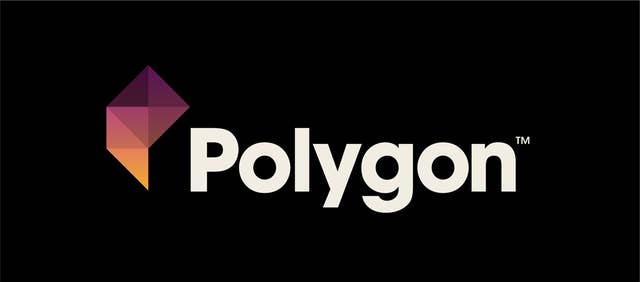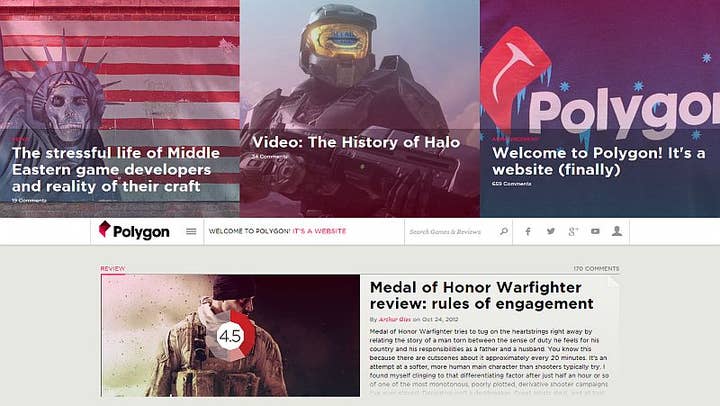Polygon: What's the Angle?
The video gaming website gets its own home, and we get the details of how and why from editor Chris Grant and Vox exec Marty Moe
Late last year, Vox Media, the company behind the sports website SB Nation and technology website The Verge, announced that it was going to enter its third market: video games. Vox Media started with a bang, by hiring an all-star cast of some of the top editors and writers in gaming journalism from a variety of websites. This caused quite a stir - and even some consternation - in game media circles, and not just among the sites who found some of their key talent gone. What were the suits at Vox planning?
The answer was fully unveiled today with the launch of Polygon, the company's video gaming website. The site not only includes news and features about the latest games, it's "about the people who make them, their cultural impact, the fans who love them and the history that preceded them," according to their press release. More than that, the site includes forums that get over a thousand posts a day on a wide range of game topics.
The development of the site began with content that was hosted on The Verge. As Marty Moe, chief content officer for Vox Media, describes it to GamesIndustry International, the process occurred in three phases. "Phase 1 was the hiring of the editorial team, and giving that team a chance to work together editorially, allowing them to map out together how they wanted to develop the site," Moe said. "The second phase was beginning their actual writing and building a community; they already have 25,000 Twitter followers and thousands of comments in the forum threads. Phase 3 was the design and building of the site which began in earnest at the beginning of the summer."
"We want to do for the video game space what The Verge has been able to begin doing for the technology world"
Marty Moe
The editorial team is made up of industry veterans including former Joystiq editor-in-chief Chris Grant and managing editor Justin McElroy, former Kotaku editor-in-chief Brian Crecente and The Escapist's former editor-in-chief Russ Pitts, among others.
"When you see what Polygon is, you'll realize that this is not like launching a cookie-cutter blog," said Moe. "This is a site which is incredibly rich and deep in terms of the content and its mix of media, be that breaking news coverage, longer form feature coverage with unique design templates, and deeply integrated video." Vox Media is trying take its formula of going deep into a vertical from the firm's success with SB Nation and The Verge.
"It's very much a big vision of what we're trying to do to bring comprehensive, high-caliber coverage to the video game world," noted Moe. "In many ways we want to do for the video game space what The Verge has been able to begin doing for the technology world. To us that means bringing to bear all aspects of digital media in a comprehensive and really elegantly expressed digital environment."
"The video game industry has always been defined by change, and we're now experiencing the most profound and rapid change in its history," said Polygon editor-in-chief Chris Grant. "That's terrifying but also genuinely exciting for a new outlet. From the mystery of new game consoles to the explosive growth in mobile gaming to the opportunity in the indie games space, there's never been a better time to launch a brand dedicated to gaming and the people who love it."
"Managing any large team remotely is an exercise in herding cats, by default"
Chris Grant
The Polygon team has been publishing up to 50 stories and videos daily on Vox Media's sister site The Verge since February 2012. "What we're launching this week is a foundation," said Grant. "It's a big, ambitious foundation, but it's still step one. There are a lot of places we want to go, a lot of places we want to invest in and pursue."
The vision for Polygon was an expansive one. "We knew we had to have a site, we knew it had to be beautiful, and it had to be responsive," noted Grant.
But it doesn't stop with the launch. "We have a full team of developers that are working on this thing, and will be working on it full time after launch," he continued. "We have a full team of editors and we're still hiring. We do see this as the starting point."
Grant feels this effort is fundamentally different than most other sites. "With a lot of people who work on the web, you plan a big launch thing, then you launch it, and then you proceed to not do anything for a couple of years," he said. "Then it no longer is competitive, and then you spend a couple of months rethinking it, you do some touchup and you launch it again. Rinse, repeat. Our goal is really to treat it more as an app, to where we're constantly adding features, constantly iterating in design."
With such an all-star team of people, many of whom were used to being in charge, has managing them been like herding cats? "In some ways, managing any large team remotely is an exercise in herding cats, by default," said Grant. "That said, the way that we've organized the team, the way that we've built the site is that we want all these people to feel empowered and to have ownership in what they do. That's the strategy. That's not the problem with hiring that type of person, that's the benefit."

The Polygon site has a full slate of advertisers signed up for the launch, including Unilever's Clear Men Scalp Therapy, Sony Entertainment Network and Geico. "Our advertising team has been incredible, and they're very enthusiastic," said Grant. Of course the traffic numbers The Verge was posting helped in no small way. The Verge audience is now over 10 million monthly unique visitors, according to Moe. "It's setting new traffic records every month; no other independent site has grown that fast," Moe said.
Polygon plans to cover mobile games more extensively in the future. "We have some right now, but we want to ramp it up after launch," said Grant. "Certainly next year we should be hiring a handful of mobile editors and really leaning into it. Mobile is one of the most exciting things for me; I'm really excited whenever I see developers make their way to mobile."
Polygon is designed to work on any screen size, and automatically configure itself to look good on smaller screens, according to Grant. Mobile devices are responsible for more and more of the readership, and Grant believes that in a year or two more people will be reading Polygon on mobile devices than on computers. Creating a separate app for each operating system or devices seems like an enormous amount of work, and Grant believes that it can get in the way. "When you click on a link and get stopped by a request to install an app, you've lost that reader," said Grant.
"AOL doesn't have an appetite to have a major gaming site, a much bigger one"
Chris Grant
Worse, when you say no to that request, most times the link is broken and you can't get to what you wanted to read. Grant thinks Polygon's approach will be friendlier to readers. "The content is becoming abstracted; people are just going to expect they can read it, or find it, on any device," Grant said. "It should work on my watch, and my phone, and my tablet, and my Xbox, and my PS Vita, and my computer."
Asked about the competition, Grant waxed philosophical. "A little over a year ago now, when we first started talking about this, it was so bloody out there, it was so hard. There are these major players that have been uncontested for years, and all of these other sites, some of which are incredible. I don't think for a second that the competition out there isn't great; I think they don't have the same opportunity. The realities of their business model are different. Their parent company is different, or has different expectations from them. All credit to Jim Bankhoff here, and Marty Moe at Vox, for seeing a much bigger opportunity and investing in that opportunity."
Grant continued with some thoughts on a specific competitor. "If you look at certain stats like Comscore, Joystiq's the number five video game web site in North America. I don't think AOL actually knows that," Grant said. "I don't think they actually have any idea. I think Joystiq does incredible work, and the team there is so talented. AOL's got a lot of money, they have a lot of reach. AOL doesn't have an appetite to have a major gaming site, a much bigger one. That's just not where their head is. Which is fine; it just made the opportunity to come to Vox and try to do it impossible to turn down. There aren't a lot of companies out there that have that appetite; it just isn't there, which is the opportunity that Vox saw."







.jpg?width=291&height=164&fit=crop&quality=80&format=jpg&auto=webp)

